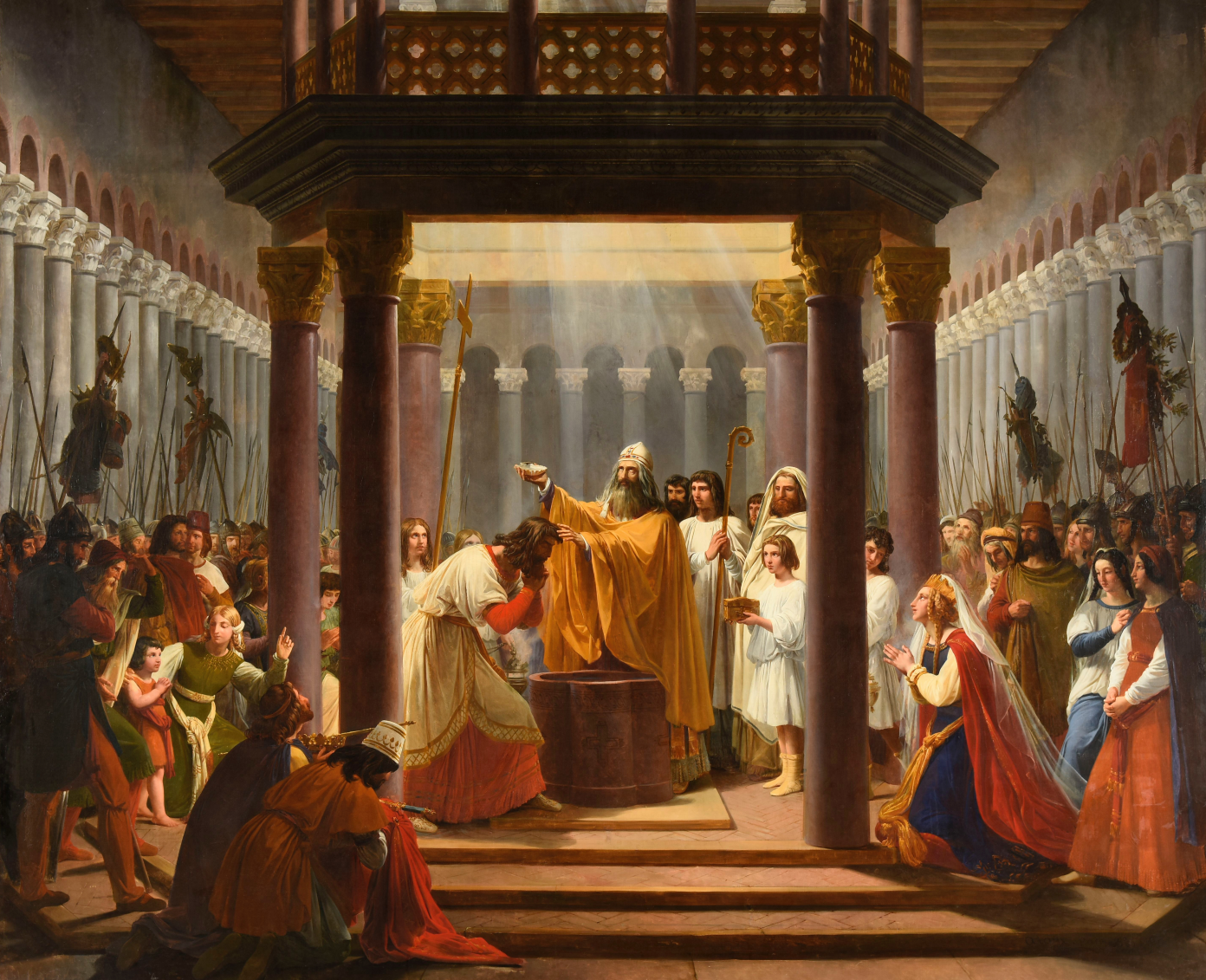Today we will look at events from Late Antiquity, a period that covers the last couple centuries of the Roman Empire in the West and the early period of the barbarian incursions, so roughly 250-500.

• 283 Emperor Carus on campaign in Mesopotamia dies. His secretary reports his death in this way: “Carus, our dearest emperor, was confined by sickness to his bed, when a furious tempest arose in the camp. The darkness which overspread the sky was so thick, that we could no longer distinguish each other; and the incessant flashes of lightning took from us the knowledge of all that passed in the general confusion. Immediately after the most violent clap of thunder, we heard a sudden cry that the emperor was dead; and it soon appeared that his chamberlains, in a rage of grief, had set fire to the royal pavilion, a circumstance which gave rise to the report that Carus was killed by lightning.” Carus’s demise leaves the throne in the hands of his sons Carinus and Numerian.
• 303 In Nicomedia, a large number of Christians suffer martyrdom when their basilica is burned down.
• 304 St Anastasia martyr d. Anastasia is murdered in the persecutions of the emperor Diocletian. Her cult became strong in Constantinople and she will be honoured in the second of three masses in Rome on Christmas morning in her basilica at the foot of the Palatine.
• 360 In North Africa, Optatus of Mileve delivers the earliest known Christmas sermon. The text he preaches on is the Massacre of the Innocents, chosen because Christianity was then undergoing trials at the hands of Julian the Apostate, the last pagan emperor. The sister of St Ambrose is consecrated as a nun by Pope Liberius.
• 362 Emperor Julian, who has abandoned Christianity to take up the old Roman paganism, publishes his “Hymn to King Helios”, the sun god.
What I am now about to say I consider to be of the greatest importance for all things “that breathe and move upon the earth” and have a share in existence and a reasoning soul and intelligence, but above all others it is of importance to myself. For I am a follower of King Helios. And of this fact I possess within me, known to myself alone, proofs more certain than I can give. But this at least I am permitted to say without sacrilege, that from my childhood an extraordinary longing for the rays of the god penetrated deep into my soul; and from my earliest years my mind was so completely swayed by the light that illumines the heavens that not only did I desire to gaze intently at the sun, but whenever walked abroad in the night season, when the firmament was clear and cloudless, I abandoned all else without exception and gave myself up to the beauties of the heavens.
• 386 Christmas is celebrated on this date in Antioch over much objection (locals preferred a January 6 date) as John Chrysostom asserts: “I have three convincing arguments to share with you through which we will know for sure that this is the time at which our Lord Jesus Christ, God the Word, was born.” In Cappadocia, Gregory of Nyssa sermonizes on the nativity, saying that it is not by chance that Christ was born on the day of the winter solstice. Nature seems to me to say: “Know, oh man! that under the things which I show thee, mysteries lie concealed. Hast thou not seen the night, that had grown so long, suddenly checked? Learn hence, that the black night of Sin, which had reached its height, by the accumulation of every guilty device, is this day, stopped in its course.”
• 406 Germanic barbarians – Vandals, Suevi, and Alans – invade the Roman empire, crossing the frozen Rhine at Coblenz.
• 409 Emperor Honorius is forced to bribe the rampaging Goths with 5,000 pounds of gold, 30,000 pieces of silver, 4,000 silk tunics, 3,000 scarlet hides, and 3,000 pounds of pepper. Imperial decree abolishes the office of “Magistrate of the Peace” as tending to corruption.
• 441 In his exile in Phrygia, Cyrus Panopolites, the bishop of Cotyaeum, preaches a 30-second Christmas sermon in a front of a hostile congregation that had murdered four previous bishops. Here it is in its entirety:
Brethren, let the birth of God our Saviour Jesus Christ be honoured with silence, because the Word of God was conceived in the holy Virgin through hearing alone. To him be glory for ever. Amen.
The oration was greeted with great enthusiasm instead of a lynching, and Cyrus went to become a beloved bishop.
• 496 Clovis and 3,00 Franks are baptized as Catholic Christians. [pictured above] Gregory of Tours described the occasion: The public squares were draped with coloured cloths, the churches were adorned with white hangings, the baptistry was prepared, sticks of incense gave off clouds of perfume, sweet-smelling candles gleamed bright and the holy place of baptism was filled with divine fragrance. God filled the hearts of all present with such grace that they imagined themselves to have been transported to some perfumed paradise. Clovis was leader of the Frankish tribe that had occupied most of Gaul. His conversion to Roman Catholicism was a triumph over the paganism of his ancestors and the lure of Arian Christianity to which many other barbarians had been converted. (Some historians make the case that the baptism took place in 508.)